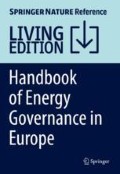Abstract
Households need energy for everyday activities. Energy enables people to participate in society. However, access and affordability of energy are not equally distributed. If people are not able to use an appropriate amount of energy, or if energy bills push them below the poverty line, pundits phrase this phenomenon energy poverty. Energy poverty is a multidimensional phenomenon, cutting across different policy areas. This chapter scrutinizes how energy poverty can be defined, what the main drivers are, and which policies have been put in place. Internationally, there is no consensus how to measure energy poverty, nor is there comprehensive policy. Yet the debate on energy poverty touches on crucial issues of climate policy. Carbon tax initiatives will have to pay more attention to social inequality in private energy consumption if they are to be successful.
References
ACER. (2018). Annual report on the results of monitoring the internal electricity and natural gas markets in 2017 – Consumer empowerment volume. Belgium: Brussels.
Berry, A. (Mars 2018). Measuring energy poverty: Uncovering the multiple dimensions of energy poverty. Working papers/CIRED. http://www2.centre-cired.fr/IMG/pdf/cired_wp_2018_69_berry.pdf
Bickerstaff, K., Walker, G., & Bulkeley, H. (2013). Energy justice in a changing climate: Social equity and low carbon energy. Just Sustainabilities. Zed Books. http://gbv.eblib.com/patron/FullRecord.aspx?p=1426831
Boardman, B. (1988). Fuel poverty. London: Belhaven Press.
Bouzarovski, S. (2014). Energy poverty in the European Union: Landscapes of vulnerability. Wiley Interdisciplinary Reviews: Energy and Environment, 3(3), 276–289.
Bouzarovski, S. (2018). Energy poverty: (Dis) Assembling Europe’s infrastructural divide (1st ed. 2018). Cham, Switzerland: Springer.
Bouzarovski, S., & Petrova, S. (2015). A global perspective on domestic energy deprivation: Overcoming the energy poverty–fuel poverty binary. Energy Research & Social Science, 10, 31–40. https://doi.org/10.1016/j.erss.2015.06.007.
Bouzarovski, S., Petrova, S., & Sarlamanov, R. (2012). Energy poverty policies in the EU: A critical perspective. Energy Policy, 49, 76–82.
Bridge, G., Barr, S., Bouzarovski, S., Bradshaw, M., Brown, E., Bulkeley, H., & Walker, G. (2018). Energy and society: A critical perspective. Routledge. https://ebookcentral.proquest.com/lib/gbv/detail.action?docID=5405519
Buzar, S. (2007). Energy poverty in Eastern Europe: Hidden geographies of deprivation. Aldershot: Ashgate.
Castaño-Rosa, R., Solís-Guzmán, J., Rubio-Bellido, C., & Marrero, M. (2019). Towards a multiple-indicator approach to energy poverty in the European Union: A review. Energy and Buildings, 193, 36–48. https://doi.org/10.1016/j.enbuild.2019.03.039.
Csiba, K. (Ed.). (2016). Energy poverty handbook. European Union: Brussels. https://publications.europa.eu/en/publication-detail/-/publication/5e2b1b12-c03d-11e6-a6db-01aa75ed71a1/language-en/format-PDF/source-69560451. https://doi.org/10.2861/094050.
Department of Energy and Climate Change. (2013). Fuel poverty report – Updated August 2013. London: Department of Energy and Climate Change.
Dobbins, A., & Pye, S. (2016). Member State level regulation related to energy poverty and vulnerable consumers. In K. Csiba (Ed.), Energy poverty handbook (pp. 119–148). Brussels: European Union.
Großmann, K., Schaffrin, A., & Smigiel, C. (2017). Energie und soziale Ungleichheit. Wiesbaden: Springer Fachmedien Wiesbaden. https://doi.org/10.1007/978-3-658-11723-8.
Healy, J. D. (2003). Excess winter mortality in Europe: A cross country analysis identifying key risk factors. Journal of Epidemiology and Community Health, 57, 784–789.
Healy, N., & Barry, J. (2017). Politicizing energy justice and energy system transitions: Fossil fuel divestment and a “just transition”. Energy Policy, 108, 451–459. https://doi.org/10.1016/j.enpol.2017.06.014.
Hills, J. (2012). Getting the measure of fuel poverty: Final report of the fuel poverty review. London: Department of Energy and Climate Change.
Hui, A., Day, R., & Walker, G. (Eds.). (2017). Demanding energy: Space, time and change (1st ed. 2018). Cham: Springer.
Jeliazkova, M. (2014). Energy poverty: The three pillars approach. Belgium: Brussels.
Kakwani, N., & Silber, J. (Eds.). (2014). Many dimensions of poverty (1st ed. 2007). London: Palgrave Macmillan
NEA. (2015). UK fuel poverty monitor 2014–2015. Newcastle Upon Tyne: National Energy Action.
Ofgem. (2019). Consumer vulnerability strategy 2025. London: Open Government Licence.
Platt, R., Aldridge, J., & Washan, P. (2013). Help to heat: A solution to the affordability crisis in energy. London: Institute for Public Policy Research.
Sagar, A. D. (2005). Alleviating energy poverty for the world’s poor. Energy Policy, 33(11), 1367–1372. https://doi.org/10.1016/j.enpol.2004.01.001.
Schumacher, K., Cludius, J., Förster, H., Greiner, B., Hünecke, K., Kenkmann, T., & van Nuffel, L. (2015). How to end energy poverty? Scrutiny of current EU and member states instruments. Belgium: Brussels.
Strünck, C. (2017). Energiearmut bekämpfen – Instrumente, Maßnahmen und Erfolge in Europa. Bonn: Friedrich-Ebert-Stiftung Abteilung Wirtschafts- und Sozialpolitik.
Templet, P. H. (2001). Energy price disparity and public welfare. Ecological Economics, 36(3), 443–460. https://doi.org/10.1016/S0921-8009(00)00243-3.
Thomson, H., & Snell, C. (2016). Definitions and indicators of energy poverty across the EU. In K. Csiba (Ed.), Energy poverty handbook (pp. 99–115). Brussels: European Union.
Tod, A. M., & Hirst, J. (2014). Health and inequality: Applying public health research to policy and practice. Taylor and Francis. http://gbv.eblib.com/patron/FullRecord.aspx?p=1675908
Author information
Authors and Affiliations
Corresponding author
Editor information
Editors and Affiliations
Rights and permissions
Copyright information
© 2020 Springer Nature Switzerland AG
About this entry
Cite this entry
Strünck, C. (2020). Energy Poverty. In: Knodt, M., Kemmerzell, J. (eds) Handbook of Energy Governance in Europe. Springer, Cham. https://doi.org/10.1007/978-3-319-73526-9_39-1
Download citation
DOI: https://doi.org/10.1007/978-3-319-73526-9_39-1
Received:
Accepted:
Published:
Publisher Name: Springer, Cham
Print ISBN: 978-3-319-73526-9
Online ISBN: 978-3-319-73526-9
eBook Packages: Springer Reference Political Science and International StudiesReference Module Humanities and Social SciencesReference Module Business, Economics and Social Sciences

